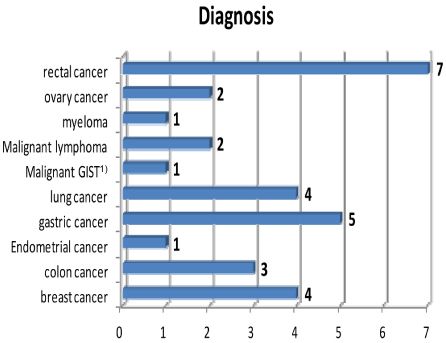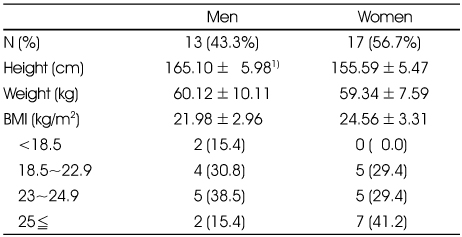References
1. Korea Centers for Disease Control and Prevention. Report of the fifth Korea National Health and Nutrition Examination Survey (KNHANES V-1) [internet] 2012. cited 2012 Aug 30. Available from:
http://knhanes.cdc.go.kr/.
2. Kelly K. An overview of how to nourish the cancer patient by mouth. Cancer 1986;588 Suppl. :1897–1901.
3. Torosian MH, Daly JM. Nutritional support in the cancer-bearing host, Effects on host and tumor. Cancer 1986;588 Suppl. :1915–1929.
4. Bottomley A. Pshchosocial problems in cancer care, a brief review of common problems. J psychiatric Health Nurs 1997;4(5):323–331.
5. Ovesen L, Allingstrup L, Hannibal J, Mortensen EL, Hansen OP. Effect of dietary counseling on food intake, body weight, response rate, survival and quality of life in cancer patients undergoing chemotherapy: A prospective, randomized study. J Clin Oncol 1993;11(10):2043–2049.
6. Matthews TW, Lampe HB, Dragosz K. Nutritional status in head and neck cancer patients. J Otolaryngol 1995;24(2):87–91.
7. Kim EK, Yang YH, Choi SM. Nutritional status of cancer patients upon admission. J Korean Acad Nurs 1999;29(2):271–280.
8. Pierce JP, Newman VA, Flatt SW, Faerber S, Rock CL, Natarajan L. Telephone counseling intervention increases intakes of micronutrient and phytochemical-rich vegetable, fruit and fiber in breast cancer survivors. J Nutr 2004;134(2):452–458.
9. Snetselaar LG. Nutrition counseling skills. Clin Nutr Insight 1990;16(7):6.
10. Holli BB. Using behavior modification in nutrition counseling. J Am Diet Assoc 1988;88(12):1530–1536.
11. Lee JH. Introduction to counseling psychology 5th edth ed. Seoul: Park Young Co; 1989. p. 3–17.
12. Choi KB, Lee SM, Lyu ES. Patient perceptions of clinical nutrition service. J Korean Diet Assoc 2012;18(1):59–71.
13. Do MH, Lee SS, Jung PJ, Lee MH. The effect of individual nutrition counseling on diet and nutrition status of postoperative breast cancer patients. Korean J Nutr 2004;37(7):557–565.
14. Moon SJ, Lee YM. A Computerized nutritional education program for meal management and nutritional assessment. J Nutr Health 1986;19(3):146–154.
15. Korean Society for the Study of Obesity. Guidebook for Obesity Medical in Koreans Korean Society for the Study of Obesity; 2009. p. 17–18.
16. Korea National Statistical Office. Incidence rates of major cancers by age group[internet] 2012. cited 2012 Aug 25. Available from:
http://www.cancer.go.kr/.
17. Lee SY, Shin MH, Sung MK, Paik HY, Park YK, Kim J. Establishment of Korean dietary guidelines for cancer prevention. Korean J Health Promot 2011;11(3):129–143.
18. World Cancer Research Fund / American Institute for Cancer Research. Food, Nutrition, Physical Activity, and the Prevention of Cancer: a Global Perspective. Washington DC. AICR [internet] 2012. cited 2012 Aug 10. Available from:
http://www.wcrf.org/.
19. Cross AJ, Leitzmann MF, Gail MH, Hollenbeck AR, Schatzkin A, Sinha R. A prospective study of red and processed meat intake in relation to cancer risk. PLoS Med 2007;4(12):e325.
20. Cho GA, Paik HY, Park MS, Lee EK. Effects of nutrition counseling on diet and nutritional status of cancer patients on radiotherapy. J Nutr Health 2000;33(2):193–201.
21. Kim TY. Lifestyle modification for cancer prevention. Korean J Med 2003;65(1):136–140.
22. The Korean Nutrition Society. Korean Dietary Reference Intakes 2010 Dietary Reference Intakes 2010 Committee; 2010. p. 211–215.
23. Yoon EY. Dietary risk factors of gastric cancer & Nutrition intervention In : Proceedings of 2004 Spring Symposium of the Korean Society of Community Nutrition; 2004 May 29; Seoul. p. 353–365.
24. Yoo TW. Evaluation of folk cancer remedies in Korea In : Proceedings of 2004 Spring Symposium of the Korean Society of Community Nutrition; 2004 May 29; Seoul. p. 366–371.
25. Yun EY. Dietary risk factors of gastric cancer & Nutrition intervention In : Proceedings of 2004 Spring Symposium of the Korean Society of Community Nutrition; 2004 May 29; Seoul. p. 353–365.






